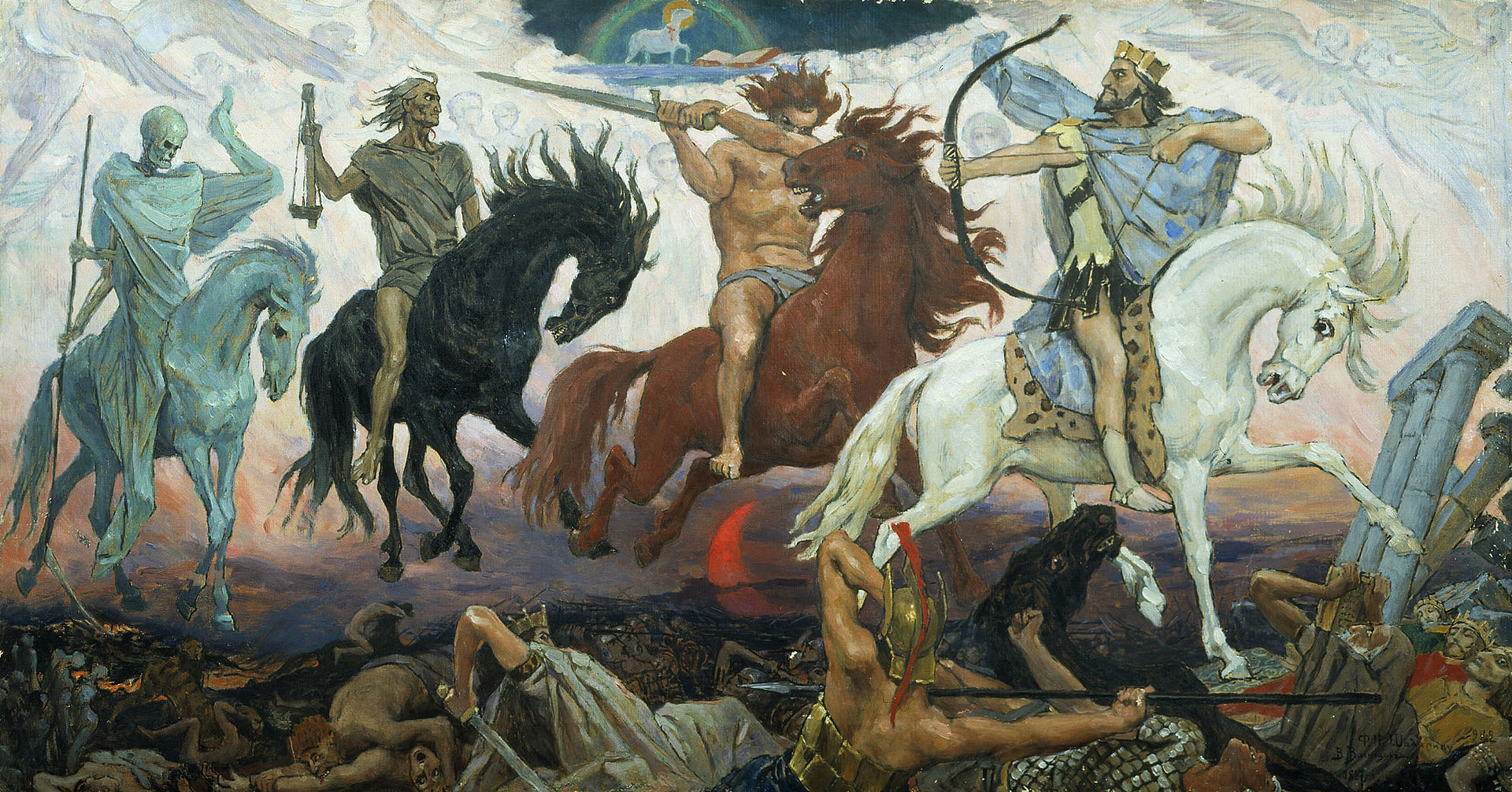The Peterloo Massacre
Shelley’s poem “The Mask of Anarchy” was constructed around the Peterloo Massacre where 15 people were killed and 400-700 seriously injured. The government of Britain was primarily in favor of the event, demonstrating the political turbulence of the period. The event occurred when Henry Hunt was meant to speak on the topics of suffrage, liberty, and political rights; however, local magistrates meant to arrest him at his speech and in doing so they trampled a child and knocked over the mother. The crowd rose up at the event in protest, and at this reaction mounted hussars charged the people.
Four Horsemen of the Apocalypse, by Victor Vasnetsov (1887).
The Four Horsemen
Shelley constructs the poem around the ideology of the Four Horsemen of the Apocalypse, changing a few names here and there: Murder, Fraud, Hypocrisy, and Anarchy (in comparison to the original Death, Famine, War, and Conquest). However, Shelley’s horsemen are more politically aligned and speak to the opinion of the British government of the 19th century. If we take a look at the descriptors of the horsemen, we can understand their context a bit better.
Murder
Murder had a “mask like Castlereagh,” referring to Viscount Castlereagh Robert Stewart whom was responsible for the imprisonment of the leader of the United Irish rebellion (2.2). He is further described as “very smooth […] yet grim” with “seven bloodhounds [that] followed him” (2.3-4). The seven bloodhounds are symbolic of the seven nations that joined in alliance with Britain: Austria, France, Russia, Prussia, Portugal, Spain, and Sweden; they are further defined by the “human hearts” thrown to them “from [Murder’s] wide cloak,” connoting the damage done to the people of Britain in an emotional context (3.4-5).
Fraud
Fraud is compared to John Scott, Baron Eldon, Lord Chancellor whom deprived Shelley of having contact with his children. In an “ermined gown” Fraud is described as weeping “big tears” that “turned to millstones as they fell” (4.3-4). Below Fraud are little children, “round his feet played to and fro,” who saw his tears as gems but were wronged when they “had their brains knocked out by them” (5.1-2,4).
Hypocrisy
Hypocrisy is compared to Henry Addington, Viscount Sidmouth, former Prime Minister and Chancellor of the Exchequer. He was in favor of the Peterloo Massacre and described as applauding the event. Hypocrisy is thus “clothed with the Bible, as with light, / And the shadows of the night” to convey the duality of hypocritical thought (6.1-2). He is described as “on a crocodile,” alluding to “crocodile tears” that serve to represent hypocrisy after the belief that crocodiles weep when they devour their food (6.4).
Anarchy
Anarchy is the last of Shelley’s horsemen, and is representative throughout the remainder of the poem. He is the one that is stopped by the figure that appears to the people to speak on the dangers of revenge and violence. Anarchy “rode / On a white horse, splashed with blood; / He was pale even to the lips, / Like Death in the Apocalypse” (8.1-4). Here is is related specifically to one of the original Biblical Four Horsemen of the Apocalypse: Death. Anarchy is further described as wearing “a kingly crown, / And in his grasp a sceptre shone” and upon his brow read “‘I am God, and King, and Law’” (9.1-4). His appearance is royal, and clearly is a slight at the British Royal; Shelley’s interpretation of Anarchy depicts how British rule has consequently run over political rights of the people. He is also not compared to any one person, as the other three are, but rather is meant to represent the British government in its whole.
Rise Like Lions After Slumber
Rise like lions after slumber
In unvanquishable number;
Shake your chains to earth like dew
Which in sleep had fallen on you -
Ye are many, they are few.
The above stanza appears multiple times throughout the poem and seems to anchor the Shelley’s purpose. His message is not to incite a violent revenge but to remind the people that their power comes in their numbers, in unison. He is speaking out against the political oppression, chanting it through his poem with the above stanza. Shelley is deliberately creating a symbolic “Mother” figure, the Mother of “the sons of England,” to warn her children against the violence of revenge: “Then it is to feel revenge / Fiercely thirsting to exchange / Blood for blood and wrong for wrong - / Do not thus when ye are strong” (193-6).
For the second half of the poem, Mother is speaking to the “sons of England” for the purpose illustrated above. Her words connote justice and peace, not revenge and bloodshed:
With folded arms and steady eyes,
And little fear, and less surprise,
Look upon them as they slay,
Till their rage has died away.
Then they will return with shame
To the place from which they came,
And the blood thus shed will speak
In hot blushed on their cheek. (343-351)
She speaks to the strength of words and putting one’s foot down, but not to connote violence and war. Rather, the ones that speak to bloodshed, once their “rage has died away” will be left ashamed, and the blood will show as “hot blushed on their cheek.” Shelley exemplifies this by producing the poem, demonstrating the very words and message he is connoting.
Sourced:
Shelley, Percy. “The Mask of Anarchy.” Romanticism, edited by Duncan Wu, Wiley Blackwell, 2012, pp. 1120-1131.
